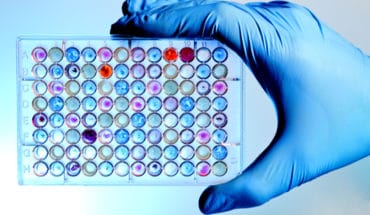NICE guidelines published last year recommended that all bowel cancer patients should be tested at diagnosis for signs of Lynch syndrome but we know that this isn’t happening in eight out of 10 NHS hospitals in England. It’s absolutely vital that these guidelines are followed because Lynch syndrome, which is an inherited condition, can increase the risk of developing bowel cancer to up to 80 per cent.
It’s absolutely vital that these guidelines are followed because Lynch syndrome, which is an inherited condition, can increase the risk of developing bowel cancer to up to 80 per cent.
During Bowel Cancer Awareness month, we are highlighting the importance of following these guidelines to Clinical Commissioning Groups, healthcare workers and local health bodies. Only six per cent of CCGs in England are commissioning molecular tests that look for signs of Lynch syndrome in all people diagnosed with bowel cancer and 65 per cent said they don’t commission NICE guidance at all. In terms of value for money, a molecular test for signs of Lynch syndrome costs around £200, which is less than half the price of a colonoscopy. We agree that this is an upfront cost but the long-term savings are substantial in terms of avoidingtreatment for advanced bowel cancer, disability and rehabilitation.
Bowel cancer is England’s second biggest cancer killer and 34,000 people are diagnosed with the disease every year. If it is caught early enough, it can often be successfully treated, but Lynch syndrome is a silent condition and many people don’t even know they carry the faulty genes that are also linked to an increased risk of ovarian cancer, stomach cancer and womb cancer.
An estimated 175,000 people in the UK have Lynch syndrome but 95 per cent of people with Lynch do not know they have it because of a lack of systematic testing.It’s vital to test for the condition at diagnosis as we know Lynch syndrome can affect treatment options for bowel cancer and it can help to identify family members who may also have the condition and be at high risk of bowel cancer. Close family members of someone who has Lynch syndrome have a 50 per cent chance of having the faulty genes themselves. If we test everyone at the time of diagnosis for bowel cancer, we will be able to ensure that those with the condition get the best treatment for them and also improve early detection rates by testing near relatives who may be cancer free. Knowing you have this condition means you can take measures to reduce your risk, including dietary and lifestyle changes, and receive regular colonoscopies to help pick up pre-cancerous changes.
Knowing you have this condition means you can take measures to reduce your risk, including dietary and lifestyle changes, and receive regular colonoscopies to help pick up pre-cancerous changes.
For the last five years, Bowel Cancer UK has been raising awareness about Lynch syndrome among health care workers and the general public. Bowel Cancer UK and Beating Bowel Cancer is calling on Cancer Alliances, CCGs and local health bodies to work together to ensure testing for Lynch syndrome can be carried out until a national policy is developed and funded by NHS England.
- Follow NICE guidance and test for Lynch - 23rd April 2018






